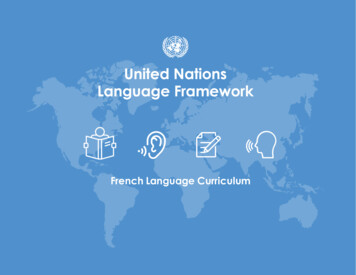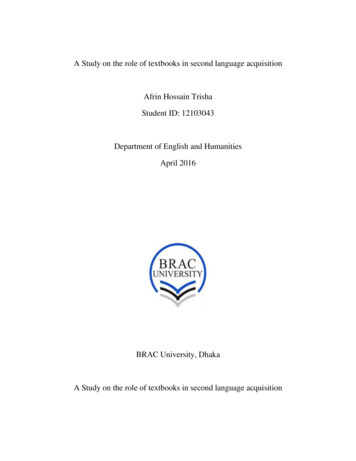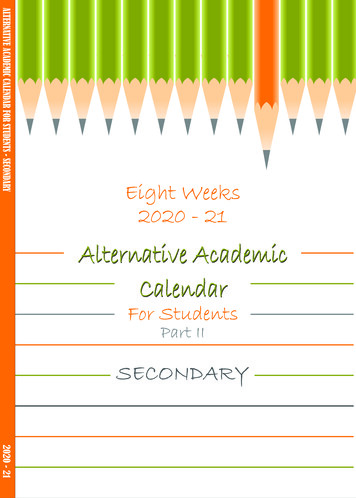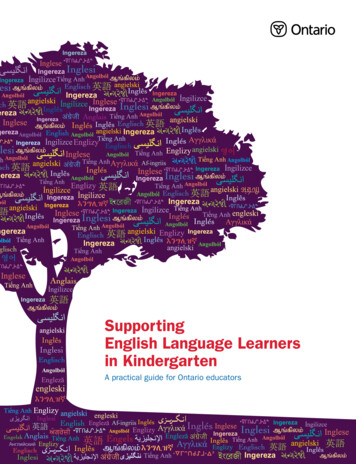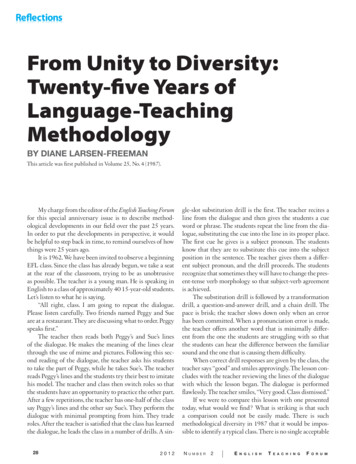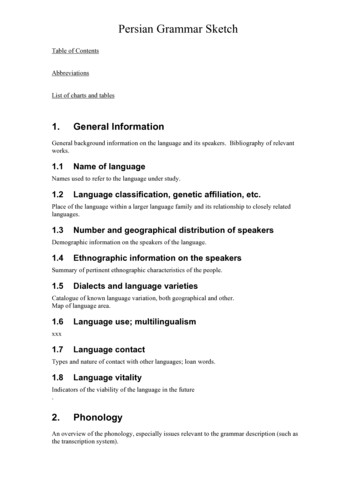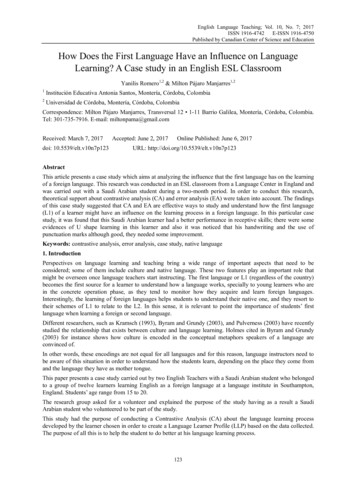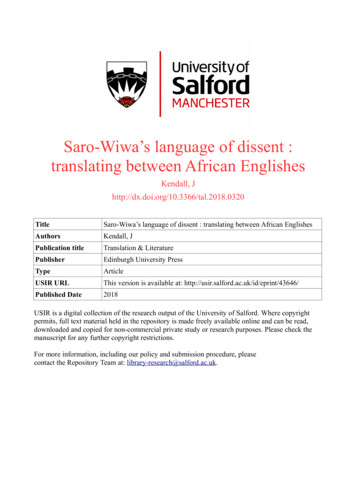
Transcription
Saro-Wiwa’s language of dissent :translating between African EnglishesKendall, Wiwa’s language of dissent : translating between African EnglishesAuthorsKendall, JPublication titleTranslation & LiteraturePublisherEdinburgh University PressTypeArticleUSIR URLThis version is available at: d Date2018USIR is a digital collection of the research output of the University of Salford. Where copyrightpermits, full text material held in the repository is made freely available online and can be read,downloaded and copied for non-commercial private study or research purposes. Please check themanuscript for any further copyright restrictions.For more information, including our policy and submission procedure, pleasecontact the Repository Team at: library-research@salford.ac.uk.
1
2Judy Kendall: ‘Saro-Wiwa’s Language of Dissent: Translating between African Englishes’This article calls attention to the essential translational aspect of linguistic experimentation inliterary uses of African Englishes in colonial and postcolonial West African literature. Itfocuses mainly on the literature of the most linguistically diverse country in Africa – Nigeria.Drawing on the theoretical work of Itamar Even-Zohar, Lawrence Venuti and PierreBourdieu, it demonstrates how the use of different Englishes in this literature act in atranslational way, relating and responding to cultural, political and social contexts. Specificattention is paid to Amos Tutuola’s use of interlanguage and diglossia; Chinua Achebe’smanipulation of acts of code-switching and mixing; and how Ken Saro-Wiwa’s developmentof a unique language of dissent in his novel Sozaboy: A Novel in Rotten English is built uponthese earlier experimentations with translations between Englishes.Keywords: Ken Saro-Wiwa, Chinua Achebe, Amos Tutuola, Englishes, code-switching,interlanguage, diglossia, Itamar Even-Zohar, Pierre Bourdieu, postcolonialSaro-Wiwa’s Language of Dissent: Translating between African EnglishesJudy KendallIn his 1985 novel Sozaboy: A Novel in Rotten English, Ken Saro-Wiwa develops a uniquelanguage of dissent that builds on linguistic and translational experimentations in earlier WestAfrican literature in English. These include Amos Tutuola’s controversial use, in the preindependence The Palm-Wine Drinkard (1952), of interlanguage – a term that JenniferJenkins problematically describes as ‘learner language which has not yet reached the target’;and Chinua Achebe’s deployment in the post-independence A Man of the People (1966) ofcode-switching and code-mixing – terms that Jenkins defines as the use of ‘words, phrases,and longer stretches of speech in two or more languages’.1 In these and other cases, suchexperimentation coincides with crises in the political context in which they were conceived.This is not simple coincidence, however, as application of translation theory to the linguisticaspects of such developments will demonstrate. Saro-Wiwa, in particular, breaks significantnew ground by making deliberate use of this connection between Englishes and economic,educational, social, and political conditions in his employment of what he refers to as ‘rotten
3English’ in Sozaboy. This rotten English is a fluid language of dissent specific to the contextand development of its speaker. It consists of a highly creative, subversive mix of differentEnglishes, acutely enabling for those with no political voice. The mix is comprised ofmultiple acts of translation that present, mirror, negotiate, and challenge political and socialeffects of shifts in status through unusual relations between source and target language, andalterations in writer/narrator/translator visibility. The result is an extraordinarily bravecontribution to the development of African Englishes in literature, deliberately exposing andexploiting political effects of language choice within the specific context of postcolonialNigeria.Language use can have such an effect because, as Susan Bassnett puts it, it ‘does notsimply mirror reality, but intervenes in the shaping of meaning’.2 Separate languages,composed of discrete units used in different combinations, shape meaning differently. Suchdifferences, however subtle, reflect and result in different ways of thinking. Such aperception of language is not new. In words that scandalize today, the LondonMissionary Society referred in 1826 to the pernicious effect on the mind of particularlanguages, ‘[a]ll the Indian languages have been for so many ages the vehicle of everything in their superstition which is orally debasing or corrupting to the mind, and somuch is the grossly impure structure of heathenism wrought into the native languages,that the bare study of them often proves injurious to the mind of the European’.3 In1966 Kenneth Burke remarked, in much more even-handed words, that ‘if any giventerminology is a reflection of reality, by its very nature as a terminology it must be a selectionof reality; and to this extent it must function also as a deflection of reality’.4As a result of the global spread of English in the twentieth century the number ofEnglishes that now exist is vast. This is particularly evident in Africa. Hans-Georg Wolf’sattempt at categorization breaks down West African English into ‘national varieties’, and
4then divides Nigerian Englishes into Yoruba-, Igbo-, and Hausa-influenced sub-varieties. Healso notes the dominance of varieties that have originated in areas that are prosperingeconomically, implying a relation between environment and use of English that is veryrelevant to a study of innovative use of Englishes in African literature, and specifically inSaro-Wiwa’s Sozaboy.5 The potential for a multiplicity of Englishes to arise in Nigeria inparticular is evident in the fact that nearly 400 other languages are spoken there. Somepossess orthographies, many do not, but all have the potential to create further sub-varietiesof Nigerian English.These different Englishes continue to evolve. Such changes in language are closelytied, as Wolf implies, to changes in the economy. They are also tied to changes in thepolitical climate. This link is reflected in the terminology that researchers in the area employ,which echoes the close and direct relation between variations of English and their colonialand postcolonial history. Analysis of successive alterations in this terminology reveals thatresearchers are keenly aware of the continued evolution of and connection between languageand political contexts. An early term for these Englishes was ‘New Englishes’, defined byPlatt, Weber, and Ho as ‘any second language new variety of English that has become“localized” or “nativized” by adopting some language features of its own’.6 Later, in the‘Author’s Note’ to Sozaboy, Saro-Wiwa cites Platt, Weber, and Ho’s work on Englishes inreference to the strong links he observes between varieties of Englishes and the socioeconomic and educational conditions in which they are used. However, Platt, Weber, andHo’s politically contentious adjective ‘new’ could imply the perspective of predominantlyWestern scholarship. In this context, Braj Kachru adopted ‘World Englishes’ as the title ofhis World Englishes journal upon its foundation in 1982. Later terms include the title ofSchneider’s book, Postcolonial Englishes, which emphasized political and historicalinfluences, while Jennifer Jenkins opted for the title World Englishes or ‘Englishes as nation-
5bound varieties’ for her 2003 book, although in the third edition of 2015 (cited above, n. 1)she changed the title to Global Englishes in order to take into account ‘the recent massivegrowth in the use of English’ in ‘newer non-nation-bound developments’ (p. xiii).Such diversification in English, particularly since it often results in the use of morethan one English in a particular area, leads inevitably to the topic of language choice. This isa contentious issue, since, as Bassnett has observed, ‘languages are rarely equal, reflectingthe hegemonic position of certain cultures’.7 Different kinds of English carry differentconnotations of status and power in accordance with the cultural and political contexts inwhich they are spoken. In addition, they convey different moods, emotions, and atmospheres.Schneider was aware of this, noting that what he termed Nigerian Pidgin was utilized bymany speakers ‘as a code of friendliness and proximity a sign of an informal, relaxedatmosphere, thus strongly imbued with a positive attitude’. He also recorded changes inperceptions of different kinds of English: ‘a “native,” i.e. British, accent is no longer reallyaimed at, as it is seen as “affected and un-Nigerian”’ or ‘affected and arrogant’.8Language choice may not, of course, be restricted simply to different kinds ofEnglish. Schneider’s reference to ‘Nigerian Pidgin’ exemplifies this, since pidgin can beclassified not as a kind of English but as a separate language altogether: a ‘new Africanlanguage’, in Ngūgī wa Thiong’o’s words, albeit one that includes some English elements.9In Ngūgī and Achebe’s well-rehearsed and hotly articulated debate about language choice forAfrican literature, the possibilities ranged from Standard British English, to pidgin, to thesixty or more languages spoken in Ngūgī’s homeland, Kenya, and the several hundredindigenous languages spoken in Achebe’s homeland, Nigeria. Ngūgī and Achebe’sdiscussions on this issue were conducted over decades, first initiated at the seminal 1962conference ‘African Writers of English Expression’ in Uganda, and then further articulated ina series of essays by Ngūgī, Achebe, and others. The debate revolved around which
6language(s) African writers should employ as ‘the creative vehicles of our imagination’(Ngūgī, ‘Language’, p. 445). Ngūgī argued for the use of the writer’s mother-tongue, Achebefor the appropriation of English.It is worth rehearsing some aspects of this debate because of its influence on the kindsof Englishes adopted in African literature, and the translational considerations that pertain tothem. Ngūgī lamented the central position English took in the production and study ofAfrican literature, outlining the dangers inherent in exposing ‘the colonial child to imagesof his world as mirrored in the written languages of his coloniser’ and thus encouraging suchchildren to look at their culture from the outside, conditioning them ‘to see that world in acertain way as seen and defined by or reflected in the culture of the language ofimposition’, and reinforced by the work of ‘geniuses of racism’ (‘Language’, p. 443). Ngūgīalso raised the question of audience, the choice of English necessarily restricting Africanreadership to those literate in English.10 Ngūgī labelled works by African writers in Englishor other European languages as Afro-European literature rather than African literature. Heacted on his principles, switching from writing novels in English to Gikuyu in the late 1970s.His last novel written in English was Petals of Blood (1977), and his first written in Gikuyuwas Caitaani Mūtharabaini, later self-translated into English as Devil on the Cross (1980).Achebe, on the other hand, embraced the potential he saw in English, or, to be more precise,in Englishes. For multilingual communities, such as those in Nigeria, he argued that Englishbecame ‘a language with which to talk to one another. If it failed to give them a song, it atleast gave them a tongue, for sighing.’ His criterion for writing in English was that it bespecifically fashioned to his ends, no longer Standard British English but made into his ‘own’language:
7The price a world language must be prepared to pay is submission to many differentkinds of use The writer should aim at fashioning an English which is at onceuniversal and able to carry his peculiar experience I feel that the English languagewill be able to carry the weight of my African experience. But it will have to be a newEnglish, still in full communion with its ancestral home but altered to suit its newAfrican surroundings.11It is significant that the writers on both sides of this debate drew on a sense of place toargue their case. Ngūgī valued his language of choice, the writer’s mother-tongue, because hesaw it as avoiding outsidedness, unlike the language he rejected, English, a language whichcame from outside, and also carried with it strongly negative colonial associations as ‘thelanguage of the master’ (‘Language’, p. 447). He argued that it was imbued with associationsand value systems that had a strongly negative impact on an indigenous African readership,alienating these readers from their own culture and history. Ngūgī’s choice of Gikuyu,however, while articulating, from the inside, the culture, world-view, and aesthetics ofGikuyu people, inevitably stood as a barrier for a non-Gikuyu speaking readership. Achebeemphasized this point. He felt that his language of choice needed to have a relation to thehome of the past but also to the present – to the ancestral and to the contemporaryinternational world. Whereas Ngūgī saw the outsidedness of English as a danger, Achebeviewed that outsidedness as an opportunity for the writer/speaker both to inhabit and to standoutside the ancestral and the contemporary. Sometimes in his novels this occurs withbewildering rapidity, with what might appear alien in the context of the ancestral homeappearing comfortably at home in the contemporary setting. Both writers agreed, however,that making the right language choice was crucial, since it allowed them to carve out aspecific position and enable a specific and perhaps otherwise unvoiced voice to speak.
8Instead of signalling a position in the accepted hierarchy, the language chosen cansignal a place outside that hierarchy, a privileged place from which the speaker can makecritical comments on that hierarchy and also create new modes of expression. In the case ofpidgin, Gillian Gane and M. A. K. Halliday have observed its function as an ‘underlanguage in which unpleasant truths are revealed’, articulating ‘a resistant counterknowledge.’12New modes of expression are also evident in Achebe and other writers’ employment ofspecific different Englishes in their novels. The very choices that writers such as Achebe,Tutuola, and Saro-Wiwa made in terms of use of new Englishes act as strong comments uponthe social, cultural, political, and linguistic hierarchies of their day. Some of these new modesof expression may, in turn, as Pierre Bourdieu predicts in Distinction: A Social Critique of theJudgement of Taste, become the new norm, with an acknowledged place inside the acceptedhierarchy.13 However, while these new varieties of English remain new, they carry, as part oftheir newness, the potential to subvert established conventions, political and linguistic, tochallenge and affect established hierarchies, and prompt shifts in position and power.This is as true of written as it is of oral language, particularly in the case of thelanguage of innovative literary texts. It is no accident that most of the writers cited so far areNigerian. In Nigeria, the country that boasts the greatest linguistic diversity in Africa,innovative language use in its literature in English is frequent, often occurring at times ofpolitical instability and change, and often taking the form of the introduction of newEnglishes, as in the work of Tutuola, Achebe, and Saro-Wiwa. It can also be seen in WoleSoyinka’s early plays. The Trials of Brother Jero and The Dance of the Forests were bothfirst produced in independence year, 1960, with The Dance of the Forests being selected forthe Nigerian Independence celebrations. These, together with Soyinka’s 1965 play The Road,draw on a mixture of influences from Yoruba, pidgin, and other varieties of English,sometimes moving, like Samson in The Road, who is both passenger tout and driver’s mate,
9almost seamlessly between one English and another:SAMSON: You no sabbe de ting wey man dey call class so shurrup your mout.Professor enh, he get class and he get style. That suit he wears now, that was the veryway he used to dress to evening service.14Soyinka also explores the uses to which different Englishes are put. In The Trials ofBrother Jero, he writes ambiguity into the expression of these uses in the play by choosingJero, an unscrupulous preacher, to articulate them:CHUME. Help him. Help him. Help ‘am. Help ‘am.JERO. Job Job. Elijah Elijah.CHUME (getting more worked up). Help ‘am God. Help ‘am God. I say make youhelp ‘am.Help ‘am quick quick.JERO . Only Brother Chume reverts to that animal jabber when he gets his spiritualexcitement,And that is much too often for my liking. He is too crude.15Linguistic innovation is evident in Gabriel Okara’s 1964 novel The Voice in which heuses translational tactics to impose Ijo syntax onto English:As a writer who believes in the utilization of African ideas, African philosophy andAfrican folklore and imagery to the fullest extent possible, I am of the opinion the
10only way to use them effectively is to translate them almost literally from the Africanlanguage native to the writer into whatever European language he is using as mediumof expression. I have endeavoured in my words to keep as close as possible to thevernacular expression. For, from a word, a sentence and even a name in any Africanlanguage, one can glean the social norms, attitudes and values of a people.16The result was a startling mixture of voice, perspective, and register, and an indication of thefluidity of identity and status, dictated simply by the costume donned, as in the followinginstance: ‘Thus this black-coat-wearing man his story had told and thus Okoloremembered.’17In other less linguistically diverse countries, innovation at times of political crisis mayappear in terms of literary structure. In 1977, at the climax of the vicious struggle for anindependent Zimbabwe, Dambudzo Marechera created an extraordinary re-envisioning oftraditional narrative form in The House of Hunger. A few years later in 1983, afterindependence, he prefaced the book with a comment that directly connects a writer’slanguage with its cultural and political milieu: ‘For a black writer the language [English] isvery racist; you have to have harrowing fights and hair-raising panga duels with the languagebefore you can make it do all what you meant it to do . discarding grammar, throwingsyntax out, subverting images from within.’18Such writings form a body of literature in English that experiments in different wayswith interlanguage, code-switching, and the creation of new and fluid language mixes. Ineach case, significant political challenges result. One way in which these might be articulatedis through reflections upon language choice and status communicated in-text via the author,narrator, or character. An example of this occurs in Achebe’s The Man of the People:
11‘That is next to impossibility,’ he said. Peter liked his words long. He had his standardsix certificate which two or three years before could have got him a job as amessenger in an office or even a teacher in an elementary school. But today theresimply aren’t any jobs for his kind of person any more.19This text emphasizes shifting relations between language, status, and, in this case,employment opportunities.A political comment may occur paratextually via article, interview, or author’s note.While Marechera uses an interview, published together with his novella, to comment on hissometimes violent appropriation of English, Saro-Wiwa declares, in Sozaboy’s ‘Author’sNote’, the influence of the political environment of the Nigerian Civil War on hisemployment of rotten English.Okara’s The Voice articulates political challenge stylistically. In this book, codemixing works with semantic content to challenge over-passive acceptance of a new politicalregime at the expense of older traditional wisdom: ‘Our fathers’ insides always containedthings straight and we did the straight things till the new time came.’ The main character,Okolo, observes the inevitably destructive result of language: ‘Names bring divisions, anddivisions, strife. So, let it be without a name.’ The only way to avoid corrupting ‘yourpurpose in this world’ is to ‘keep it clean as a virgin sheet of white paper’, that is, unwritten(The Voice, pp. 50, 21, 112). The mix in this English of African proverb, biblical phrasingand rhythms, and British English ‘poetic’ metaphor argues eloquently for the importance ofopening the mind to different ways of thinking: ‘Why shouldn’t there be a Nigerian or WestAfrican English which we can use to express our own ideas, thinking and philosophy in ourown way?’ (Okara, ‘Language’, p. 436).
12The work of writers such as these not only reflects but pioneers transitions in attitudesto particular African Englishes in regional and international literary circles. In turn, suchshifts in attitude themselves reflect and affect a wider cultural audience, and informsucceeding writers’ linguistic innovation. This becomes evident when tracing the ways inwhich the interlanguage of Tutuola’s The Palm-Wine Drinkard is used and transformed fromTutuola to Achebe, and then startlingly re-envisioned in Saro-Wiwa’s fresh and linguisticallychallenging Sozaboy.It is no exaggeration to say that African English literature opened up with Tutuola’sThe Palm-Wine Drinkard, described by O. R. Dathorne as standing ‘at the forefront ofwestern African literature’.20 Achebe’s literary and critical explorations of different Englisheswere also vital and far-reaching, his words on the Africanization of English resonating withtwenty-first-century writers of African literature. With Sozaboy, however, Saro-Wiwa took asignificant step forward, handing over to a naive recruit in the Nigerian Civil War a ‘rotten’English previously deemed unpublishable, but which succeeds as perhaps no other Englishcould in expressing the needs, difficulties, and desires of those who might otherwise lack apolitical voice.The fact that language is hierarchical means it also acts as an agent of exclusion, andvariations from standard language ideology are noted as errors, as delineated by Jenkins inGlobal Englishes (p. 22). This is evident in the notoriously contrasting but ferventlyarticulated reactions to the language of The Palm-Wine Drinkard of its early readers, critics,and editors.21 These reactions refer to what was perceived as Tutuola’s grammaticalincompetency in English; his imaginative leaps and playful freedom of voice; his apparentdisregard of narrative conventions; his skill in translating oral storytelling to the written page;the degree of intentionality in his linguistic experiments; his success in rendering Yoruba
13speech rhythms and idiom in English; and the book’s place as the first representative of aYoruba English literature.Tutuola claimed that he wrote The Palm-Wine Drinkard because ‘I don’t want thepast to die. I don’t want our culture to vanish. It’s not good. We are losing [our customs andtraditions] now, but I’m still trying to bring them into memory. So far as I don’t want ourculture to fade away.’22 To achieve this, writing in his native Yoruba would not suffice, yethis limited education precluded the use of Standard British English; hence his use ofinterlanguage.Early responses by West African critics suggest acute embarrassment. They expressedfears that the book’s ‘bad grammar’ would confirm existing stereotypes of primitive,uneducated Africans. In contrast, early Western critics declared it fresh, unique, and exotic.23However, they also declared it unclassifiable, listing it in the British National Bibliographynot under ‘Literature’ or ‘Modern Fiction in English,’ but ‘English Miscellany’. Subsequentreviews further diminished its status from serious literature to that of ‘tale’ or ‘story’, DylanThomas setting the tone: ‘brief, thronged, grisly and bewitching nothing is too prodigiousor too trivial to go down in this tall, devilish story’.24Initially recommended to them by T. S. Eliot, Faber and Faber’s interest in The PalmWine Drinkard was based, as Carolyn Hart records, on its ‘roots in the West African mind’.25So important was this to Faber that they consulted an anthropologist and a historian toauthenticate the manuscript. Their judgement of the English in which it was written isindicated in the following communication to Tutuola: ‘Just as no one but a West Africancould have had such a strange tale to tell, so your manner of writing it has a charm of its own. We propose . leaving intact all those expressions which, though strictly speakingerroneous, are more graphic than the correct expressions would be.’26 Faber and Fabernevertheless altered some of the text to conform to Standard British English, and made this
14public by including in the first edition a facsimile manuscript page on which they had alteredword order and verb tenses. This distanced them from what risked being perceived as‘erroneous’ English. They also, rather troublingly, used this visual device to provide readerswith an apparently authentic glimpse into ‘the West African mind’, thus enforcing thestereotyping feared by early West African critics, turning work and writer into a Debordianspectacle to be passively accepted and consumed as a ‘pseudo-response to a communicationwithout response’.27Another effect of Faber’s editorial interference was to render Tutuola’s Englishinconsistent. Some verb tenses were ‘corrected’, others not. In Tutuola’s original text,however, his English maintains an interior logic, constituting therefore, as Ashcroft, Griffiths,and Tiffin note, ‘an important and early example of diglossis formation [diglossia] in postcolonial literature’, in other words, a new form of English possessing a ‘separate linguisticlogic’ that provided the basis of a potent metaphoric mode in cross-cultural writing.28 Such anassessment pushes Tutuola’s work with different Englishes into the realms of translation, andthis is reflected in descriptions of the language it uses. Adebisi Afolayan calls it ‘YorubaEnglish’, a language ‘possessing Yoruba deep grammar that nevertheless has many of thesurface features of conventional English grammar’.29 For Chantal Zabus, this ‘outlandish“folk-novel” precariously straddles the world of orature and that of literature and bridges thetwo by translating the one into the other’.30 Wole Soyinka cites The Palm-Wine Drinkard as‘the earliest instance [in English] of the new Nigerian writer gathering multifariousexperience under, if you like, the two cultures, and exploiting them in one extravagant,confident whole’.31 The connection with translation is also emphasized in Overvold, Priebe,and Tremain’s comment in The Creative Circle on ‘the centrality of translation to all who areinvolved in the field of African literature’ and Olabode Ibironke’s argument that ‘African
15writers are necessarily translators, in that the distinction between “source” and “target” areconstantly interlocked and interchanging’.32The Palm-Wine Drinkard constitutes a very specific kind of translation. It involvedTutuola drawing from both Yoruba and Standard British English, and altering the originalYoruba content and the English medium in which it is written, to produce a unique diglossiathat confidently combines Yoruba oral literature, rhythms, proverbs, and musicality withEnglish religious literature and phraseology, and more contemporary references to modernday Nigeria, all working together and on the same level.It is the creative confidence of this language as well as its mixing of sources thatinforms the later experiments conducted by Saro-Wiwa in Sozaboy. Like the narrator in ThePalm-Wine Drinkard, the main character of Sozaboy presents the reader with this newlanguage as a fait accompli, without comment or apology. However, perhaps informed by thestrongly-worded reception which greeted the experimental language of The Palm-WineDrinkard, Saro-Wiwa felt the need to articulate directly his intentions in relation to theEnglish of his novel via his ‘Author’s Note’. This ‘Note’ bears a relation to the translator’spreface in that Saro-Wiwa is outlining his particular approach to translation. A similar needfor articulacy in relation to a writer’s particular uses of English can be discerned in a numberof Achebe’s interviews and articles, and in the interview with Marechera appended to TheHouse of Hunger. This indication of the parallels between the innovative use of Englishes inAfrican literature in English and the work of translators suggests that examining relevantworks by Tutuola, Achebe, and Saro-Wiwa in terms of their status as translations or quasitranslations will help uncover the reasons why the Englishes they contain, culminating in therotten English of Sozaboy, have had and continue to have such strong linguistic and politicaleffects, effects that diverge significantly from those produced by texts written in a morestandard English.
16The Palm-Wine Drinkard was written shortly after the Second World War in 1946. Itwas published in 1952 in the years leading up to Nigerian independence. The timing of such awork, and its position on the borders of translation which the newness of its English accordsit, is significant, given Itamar Even-Zohar’s observation of the preponderance of translatedliterary work at times of instability in terms of languages and cultures and at turning points ina society’s literary, cultural, or political life: ‘historical moments where established modelsare no longer tenable for a younger generation’. 33 At such turning points, translatedworks normally situated at the periphery of a culture’s literature shift to a central, highlyinfluential, position, and are in a position to introduce elements into that culture’s literaturethat did not exist before, bot
of a unique language of dissent in his novel Sozaboy: A Novel in Rotten English is built upon these earlier experimentations with translations between Englishes. Keywords: Ken Saro-Wiwa, Chinua Achebe, Amos Tutuola, Englishes, code-switching, interlanguage, diglossia, Itamar Even-Zohar, Pierre Bourdieu, postcolonial
